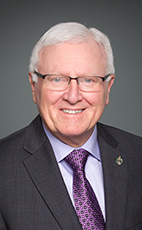It is a little disappointing, Mr. Speaker, that we cannot share our time in this debate. It is disappointing because here in Canada we do try to resolve our differences by giving different points of view. We do not resort to violence or military action. It is just disappointing that this happened this way.
This is the third time that I have spoken about this issue over several years. I want to compliment the member for Brampton Centre for raising it before and also the member today for raising it again, because it is an issue that certainly means a lot to a lot of people. It brings out a lot of emotion and a lot of sadness to people's hearts when we talk about it.
I was just thinking that we in North America were all moved by the disaster of September 11 when several thousand people died. Here, we are talking about a million and a half people, 250 times as many people, who were lost during this period from 1915 to 1923. It was a catastrophe of monstrous proportions that took place at the end of the Ottoman Empire and involved World War I.
We can only just possibly imagine what it is like for the Armenians to grasp the situation when we have turned our whole continent inside out because of the September 11 disaster that we experienced. In fact, it was only a small disaster relative to what they have gone through.
The whole debate surrounds the terrible massacre of human life between 1915 and 1923, with estimates in excess of a million and a half men, women and children lost. There was violence and there were deportations, internments, mass murders and all kinds of atrocities. We in the House can hardly imagine what went on.
It is good that we raise these issues, discuss them and raise public awareness of them and that we extend our sympathy to those who still suffer and are torn over the awful events.
We abhor any mass slaughter or killings, whether they are in Rwanda, the Middle East or Europe, by any country or any group. It is important that we remember these issues and work toward finding ways to prevent them. We have a responsibility in Canada to do that now and we have a responsibility to make sure that atrocities in the past are not forgotten. We are very fortunate here in the way we resolve our issues and fortunate that we have not been subject to anything like what those people in any of these disasters that I mentioned had to have experienced.
I think it is very important that we make sure we do everything we can to prevent them, as we are in Afghanistan now and in other areas around the world. It is certainly important that we keep the issues before the public so that we will never forget these awful things that happened.
I want to end my comments with that. This is the third of three debates I have been involved with, and perhaps if I had not been involved with the debates I would never have known anything about this. I hope that Canadians who are listening will take a lesson from it, learn about this issue and give it a lot of thought.

